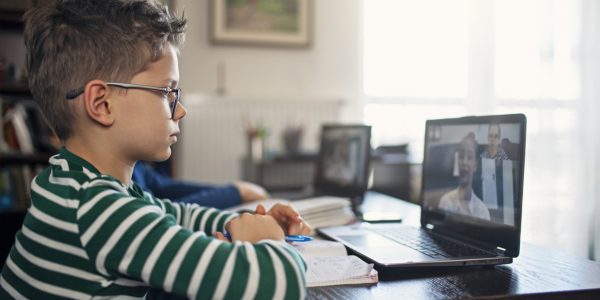
18/05/20
4 min read
A specially-designed online survey of over 4,000 parents in England between 29 April and 12 May shows that children from better-off households are spending 30% more time each day on educational activities than are children from the poorest fifth of households.
With schools shut for most pupils since 23 March, new Nuffield-funded research from the IFS examines children’s learning during lockdown.
The gap of an hour and a quarter every day means that children in better-off families will already have done extra home learning hours equivalent to a week and a half of full-time school compared with poorer children by 1 June, when some students could return to school. If schools were to remain closed until the end of the current term, that gap would grow to over three weeks.
As well as spending more time on educational activities overall, pupils from better-off households are more likely to spend time on activities that may be particularly beneficial, such as online classes and with private tutors. Online classes and other active teaching are far more prevalent in the private sector than in the state sector. And even within the state sector, higher-income pupils are more likely to attend schools that provide online teaching.
As a result, school closures are almost certain to increase educational inequalities. Pupils from better-off families are spending longer on home learning; they have access to more individualised resources such as tutoring or chats with teachers; they have a better home set-up for distance learning; and their parents report feeling more able to support them. Policymakers should already be thinking about how to address the gaps in education that the crisis is widening.
The report also finds that:
- The schools of better-off students provide more resources for home learning. Even within state secondary schools, 64% of parents in the richest fifth of families report their child’s school offering interactive resources such as video or text chatting, compared with 47% for children in the poorest fifth of families. Four-fifths of private school students get some online teaching.
- Children from the top fifth of the income distribution are twice as likely as the poorest children to be getting private tutoring. And among children who have tutors, more affluent students spend longer being tutored. 12% of the most affluent students receive an hour or more of private tuition each school day.
- Better-off students also have more resources for home learning. Technology is a challenge for the 14% of less well-off students who do not have a computer or tablet to access schoolwork. But study space – which is harder for policy to address – seems to be an even bigger constraint: 58% of primary school students in the poorest families do not have access to their own dedicated study space.
- The majority of parents are finding supporting home learning difficult. Almost 60% of the parents of primary school children, and almost half of the parents of secondary school children, report that they are finding it quite or very hard to support their children’s learning at home. However, most students – 74% of those in primary school and 79% of those in secondary school – are completing most or all of their schoolwork.
- Even so, under half of parents currently state they would be willing to send their child back to school if given the choice. And less affluent parents, whose children appear least equipped for coping with home learning, are more likely than others not to want to send their children back to school.
Lucy Kraftman, Research Economist at IFS and an author of the report, said:
“There are significant differences in how children are spending their time during school closures. Children in lower-income households are spending significantly less time on both schoolwork and non-school learning activities than their better-off peers. Compared with children in the poorest fifth of families, those in the richest fifth are spending more than 75 minutes longer every day on work assigned by their school. Even for those pupils returning to school on 1 June, over the 34 school days that closures will have been in place, this will translate to a week and a half of full-time school. Children in better-off families are also more than twice as likely to receive private tutoring, with around 12% of these students being tutored for an hour or more each day. These differences will likely widen pre-existing gaps in test scores between children from different backgrounds.”
Alison Andrew, Senior Research Economist at IFS and another author of the report, said:
“Children in lower-income households are less likely to have their own space for schoolwork and less likely to have a computer or tablet to use for school. On average, the state schools that lower-income children attend are also less likely to provide online classes and other interactive activities than the state schools that higher-income children attend, leaving children more reliant on their parents for help. But less than a third of parents in the poorest fifth of families would send their child back to school if given the choice, compared with half of parents from more affluent backgrounds. This risks leaving the children least able to cope with home learning remaining at home even as their better-off classmates return to school.”
Josh Hillman, Director of Education at the Nuffield Foundation, said:
“Children from lower-income families are already disadvantaged in educational terms, but this new research from the IFS shows that this is being compounded in various ways by being at home rather than in school during the lockdown. On average, these children are spending less time on educational activity, have poorer access to technology, educational resources and extra support, and less likelihood of a quiet dedicated working space in the home. The government needs to address these issues, both during the period of lockdown and when pupils start to return to schools bringing this additional disadvantage with them.”


















































